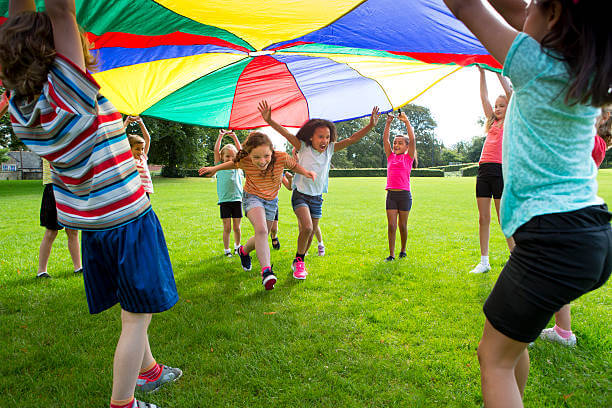There are many benefits of children playing outside—they’re able to exercise, spend time with friends, enjoy time in the sun, take a break from screen time, and so on. However, did you know that playing outdoors can also help brain development?
Keep reading to learn how playing outside is incredibly beneficial when it comes to a child’s young mind!
1. It Improves Their Sensory Skills
When playing outside comes to mind, you most likely automatically think of a playground. But have you ever considered how the different parts of a playground might help with brain development?
For instance, swings help a child develop coordinated movements. Climbing a ladder helps with balance and coordination. Sliding helps their sense of balance. Some of the most fun activities when playing outside have the most significant impact on brain development.
2. It Helps Attention Span
Playing outside allows children to enjoy themselves in an unstructured environment. When on their own outside, they can self-direct and determine how they choose to spend their time.
This not only helps with creativity, but also helps them come up with different kinds of activities that keep them engaged. The more time they spend invested in these outdoor activities, the more they’ll be able to pay attention to one project or activity in the long run.
3. It Decreases Stress
It’s no secret that spending some time in the sun can make you feel better. Children can experience natural benefits by playing outside, such as simply spending time in the fresh air and sun, along with physiological benefits.
Playing outside helps reduce stress hormone levels in the brain and body, which also works hand in hand to ensure healthy functioning and brain development as they grow up. If you find that a child remains stressed even after spending time outside, it might be worthwhile to consider these calming exercises to help.
4. It Improves Executive Function
Kids can become more independent on the playground, from inventing new games to exploring their surroundings with friends. By allowing their creativity to flourish in these outdoor spaces, they’re able to learn and improve on executive function skills such as planning, prioritizing, decision-making, problem-solving, multitasking, negotiating, and more.
In this newfound self-reliance, they’re able to not only better their executive function, but also improve their organizational abilities as well. These new skills can increase their self-esteem as well.
5. It Stimulates Multiple Senses at Once
When outside, there is so much to do, see, touch, smell, hear, and so on. Playing outside can stimulate multiple senses at once, which immerses a child into a multi-sensory world. Whether it’s hearing birds chirp or cars drive by, smelling fresh flowers, or seeing animals run around, multiple senses are stimulated at once when playing outside. This helps children not only engage these senses, but sharpen them as well.
6. It Improves Interpersonal Skills
Whether it’s around the neighborhood or at the park, kids frequently meet other kids when playing outside. Friendships easily develop on the playground, and playing together teaches children how to build genuine friendships with one another. Interactions at a public play area allow them to meet kids their age, but from different backgrounds as well. These interactions at a young age help build and improve their interpersonal skills for years to come.
7. It Increases Interest in New Topics
Spending more time outside exposes children to new sights, sounds, and smells that their screens might not provide. By experiencing these new things, new curiosities and questions are bound to come up. They might take an interest in something that they otherwise would not have discovered. Taking a liking to a new topic can help increase their brain functionality and focus when trying to learn more about it.
8. It Expands Their Learning Space
Have you ever considered placing building blocks or puzzles in a different area than they’re normally used, i.e., outside? Placing these items outside shows children that they can learn anywhere—not just inside a classroom or other indoor learning space. This can also help them realize that there’s so much more to learn about life outside of regular classroom subjects.
Making sure that children play outside is an easy, natural way to help their brain development. If you find yourself looking for natural treatments for ADD or ADHD treatment in children, look no further than the Vision Development Center of Lancaster. Located in Lancaster, PA, Dr. Arthur Seiderman has over 50 years of experience and is ready to assist with all your vision therapy needs.
Take our vision quiz today to get started.

